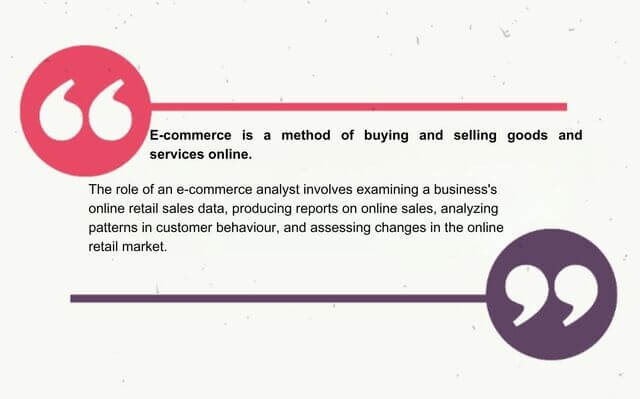


In the dynamic world of online business, where every click counts and every conversion matters, the role of an e-commerce analyst has become increasingly important. E-commerce analysts have a strong understanding of data-driven insights and a keen eye for market trends, thus playing a crucial role in decoding the complex nature of online consumer behavior. In this article, we will dive deep into the diverse realm of the e-commerce landscape, exploring the skills, challenges, and impact the e-commerce analysts have on the success of online businesses.

In today’s digital age, e-commerce has become a significant force, changing how traditional brick-and-mortar businesses operate and influencing how companies connect with their customers. Online platforms offer convenience and accessibility, creating a new way of doing business where customers expect smooth, personalized experiences and immediate access to a wide range of products and services.
The three major e-commerce markets worldwide are the United States (U.S.), China, and Europe. China emerged as the largest market in 2023 with 12.2% annual growth. It is projected that China will stay in the lead until 2027. The U.S. was the second largest market in 2023, generating revenues totaling $925.4 billion. The third biggest market is Europe with a 9.3% annual growth.
Hence, to stay competitive in this ever-changing e-commerce landscape, businesses need to navigate the complexities of digital marketing, data analysis, and customer relationships. The ability to use technology, understand customer data, and keep up with emerging trends is now essential for long-term success. Therefore, adaptability and staying up-to-date on market trends are the keys to success in this dynamic and fast-paced environment.
E-commerce analytics involves collecting data from online transactions to make data-driven decisions and boost online sales. Businesses should understand the changes in customer behavior and enhance strategies for greater effectiveness. Therefore, e-commerce analysts are equipped with a diverse set of tools to examine the vast amount of data they have at hand. They leverage advanced analytics platforms, including artificial intelligence algorithms, to uncover patterns, identify opportunities, and improve the overall digital shopping experience. Some tools include well-known platforms such as Google Analytics, Kissmetrics, Adobe Analytics, Optimizely, and many more.
By analyzing the key performance indicators (KPIs) like bounce rates, click-through rates, and conversion rates, e-commerce analysts gain valuable insights into the effectiveness of online strategies and the overall health of the digital storefront.
Moreover, their role extends beyond mere data analysis, as e-commerce analysts are instrumental in transforming insights into actionable strategies. They work closely with marketing teams to optimize campaigns and collaborate with web developers to enhance user interfaces, as well as advise on inventory management based on consumer trends.
In the ever-evolving landscape of e-commerce, staying ahead of the curve is crucial. E-commerce analysts continually update their skills to adapt to the latest technologies and industry trends. Their ability to navigate this dynamic environment ensures that businesses not only understand the present state of their online operations but also position themselves strategically for future success. You may still have hesitations about the responsibilities of e-commerce analysts and the scope of their job, so let’s discuss further.
Understanding the online consumer’s journey is similar to solving a complex puzzle, and e-commerce analysts are the puzzle masters. They trace a visitor’s path from the initial click to the final purchase, uncovering the factors that influence their decision-making. By analyzing data on bounce rates, click-through rates, and conversion rates, e-commerce analysts provide valuable insights to enhance user experience and make the purchase process more effective.
E-commerce analysts are not just data reviewers, but they also function as modern-day “soothsayers” of the digital age. By implementing the power of predictive analytics, they can predict future trends and customer behaviors. Whether it’s indicating demand for a particular product or identifying emerging market segments, e-commerce analysts play a pivotal role in helping businesses stay ahead of the curve in the fast-paced world of e-commerce.
While the world of e-commerce analysis is undeniably exciting, it has its challenges. The huge amount of data, the need for real-time analysis, and the constant evolution of technology make this field both demanding and compelling. E-commerce analysts must be skilled at adapting to changes, staying ahead of industry developments, and continually improving their analytical skills.
It’s important to highlight that the responsibilities of an e-commerce analyst extend beyond working with spreadsheets and charts; instead, their efforts directly contribute to actual business growth. By optimizing marketing strategies, enhancing user experiences, and identifying revenue opportunities, e-commerce analysts play a direct role in boosting overall financial performance. Their valuable insights enable businesses to make informed decisions that connect with their target audience, fostering customer loyalty and driving success.
An e-commerce analyst should have a bachelor’s degree in marketing, e-commerce, or a related field. Alternatively, some employers may consider equivalent work experience with relevant job duties and responsibilities. Proficiency in understanding the nuances of e-commerce operations and analyzing e-commerce data is essential. Additionally, candidates should possess skills in financial forecasting and have computer proficiency. As this role often involves marketing to enhance an organization’s e-commerce sales, a background in marketing or completion of marketing coursework can also be beneficial. E-commerce analysts must excel in teamwork and have outstanding analytical and communication skills to succeed.

As previously mentioned, the role of an e-commerce analyst significantly contributes to the success of online businesses. Here are several reasons highlighting the importance of having an e-commerce analyst in your team:
E-commerce analysts leverage data to provide valuable insights into customer behavior, preferences, and market trends. This information is crucial for making informed decisions about product offerings, marketing strategies, and overall business direction.
Understanding how users interact with an e-commerce website is key to improving the overall user experience. E-commerce analysts can identify areas for improvement, reduce friction in the buying process, and enhance navigation, leading to increased customer satisfaction and higher conversion rates.
E-commerce analysts analyze the performance of marketing campaigns, helping businesses allocate resources effectively. They identify the most successful channels, optimize ad spend, and contribute to creating targeted and impactful marketing strategies.
Efficient inventory management is vital for e-commerce success. Analysts can use data to predict demand, optimize stock levels, and minimize overstock or stockouts, ensuring that products are available when customers want to purchase them.
By staying ahead of market trends and understanding competitor activities, e-commerce analysts contribute to maintaining a competitive edge. They can identify emerging opportunities and potential threats, allowing businesses to adapt and innovate proactively.
E-commerce analysts use data to create personalized experiences for customers. By segmenting the audience based on demographics, behaviors, and preferences, businesses can tailor their offerings, promotions, and communication, breeding stronger connections with their audience.
Do you have IT recruitment needs?
Finding and hiring the right e-commerce analyst can be a challenging task. Numerous organizations prefer to choose the assistance of recruitment agencies to navigate this process and secure top-tier talent for their team. If you’re interested in understanding how a recruitment agency can help you in this attempt, read our article here. Additionally, we provide a set of tips that could assist you in your quest for an e-commerce analyst.
Clearly outline the skills, qualifications, and experience you’re looking for in a candidate. This may include proficiency in analytics tools, knowledge of e-commerce platforms, and a background in data analysis.
Prior experience in e-commerce or a related field is valuable. Familiarity with the specific challenges and dynamics of online retail can make a candidate more effective in the role. Candidates with a proven track record in navigating the complexities of the e-commerce landscape bring valuable insights and are better equipped to contribute meaningfully to your organization’s objectives. This industry experience can significantly shorten the learning curve for the selected e-commerce analyst, thus helping to swiftly adapt and drive impactful results for your business.
Assess the candidate’s technical skills, including proficiency in data analysis tools, statistical software, and e-commerce platforms. The ability to work with relevant programming languages like SQL, Python, or R may be an advantage.
E-commerce analysts need strong analytical and critical thinking skills. Assess a candidate’s ability to interpret data, draw meaningful insights, and translate them into actionable recommendations.
Effective communication is crucial for presenting insights and recommendations to non-technical stakeholders. Look for candidates who can communicate complex analytical findings in a clear and understandable way.
E-commerce analysts often encounter complex challenges. Assess a candidate’s problem-solving skills, creativity, and ability to approach issues with a solutions-oriented mindset. The e-commerce landscape is dynamic, and analysts need to adapt to changes quickly. Look for candidates who demonstrate a willingness to learn, stay updated on industry trends, and embrace new technologies.
Request examples of the candidate’s past work, projects, or analyses. This can provide insights into their approach, methodologies, and the impact of their contributions. It will provide a practical understanding of how well they can apply their knowledge to real-world scenarios in the field of e-commerce analysis.
Conduct interviews that include technical assessments and scenario-based questions. Practical exercises or case studies can help assess a candidate’s ability to apply analytical skills to real-world situations.
As businesses continue to navigate the ever-expanding landscape of online commerce, the e-commerce analyst remains a key player, guiding them to the top. Hiring the right e-commerce analyst requires a strategic approach that extends beyond mere technical qualifications. By carefully considering the insights discussed in our article and tailoring your hiring process to the specific needs of your business, you can identify and hire the right e-commerce analyst to contribute to the success of your online operations. The right e-commerce analyst with data-driven insights will guarantee your business stays ahead of the game and maximizes its online potential. For a more in-depth discussion, let’s connect at www.devsdata.com.
Frequently asked questions (FAQ)
DevsData – a premium technology partner
DevsData is a boutique tech recruitment and software agency. Develop your software project with veteran engineers or scale up an in-house tech team with developers with relevant industry experience.
Free consultation with a software expert
🎧 Schedule a meeting
“DevsData LLC is truly exceptional – their backend developers are some of the best I’ve ever worked with.”
Nicholas Johnson
Mentor at YC,
Ex-Tesla engineer,
Serial entrepreneur
Categories: Big data, data analytics and AI | Software and technology | IT recruitment blog | IT in Poland | Content hub (blog)


 Our veteran developers can help you build your project.
Our veteran developers can help you build your project.
 Explore the benefits of technology recruitment and tailor-made software.
Explore the benefits of technology recruitment and tailor-made software.
 Learn how to source skilled and experienced software developers.
Learn how to source skilled and experienced software developers.
“I interviewed about a dozen different firms. DevsData LLC is truly exceptional – their backend developers are some of the best I’ve ever worked with. I’ve worked with a lot of very well-qualified developers, locally in San Francisco, and remotely, so that is not a compliment I offer lightly. I appreciate their depth of knowledge and their ability to get things done quickly. “

Nicholas Johnson
CEO of Orange Charger LLC,
Ex-Tesla Engineer,
Mentor at YCombinator




